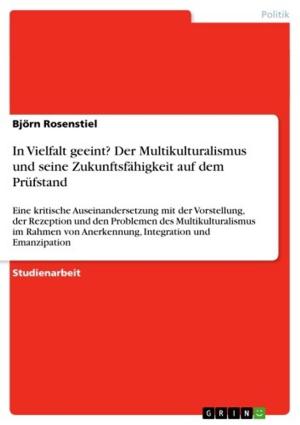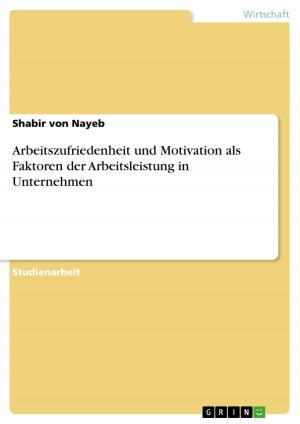In the Twilight of Patriarchal Culture: The Struggle for Female Identity in Stephenie Meyer's Twilight Saga
Fiction & Literature, Literary Theory & Criticism, British| Author: | Astrid Ernst | ISBN: | 9783656220046 |
| Publisher: | GRIN Verlag | Publication: | June 18, 2012 |
| Imprint: | GRIN Verlag | Language: | English |
| Author: | Astrid Ernst |
| ISBN: | 9783656220046 |
| Publisher: | GRIN Verlag |
| Publication: | June 18, 2012 |
| Imprint: | GRIN Verlag |
| Language: | English |
Diploma Thesis from the year 2011 in the subject English Language and Literature Studies - Literature, grade: 1, University of Vienna (Anglistik und Amerikanistik), course: Anglistik- Literatur- Gender Studies , language: English, abstract: The paper investigates Meyer's popular saga from a feminist point of view focusing on the development of Bella's character and her quest for identity in a rigidly patriarchal world, which forces her to choose between mutually exclusive options. It will be argued that Bella's life is entirely determined by the two central male characters who form a polarized axis that slowly tears her apart. Bella's low self-esteem and her strong attachment to the over-idealized Edward Cullen will be read as a symptom of her placelessness in a world that does not leave room for her to develop as an autonomous subject. Bella's wish to become a vampire can be equalled with woman's desire to gain access to a higher social realm via her husband and thus escape her marginalisation in patriarchal culture. As Beauvoir writes: ' There is no other way out for her than to lose herself, body and soul, in him who is represented to her as the essential, as the absolute'(Beauvior, The Second Sex, 653). In order to become a supposedly superior being and to live eternally in the idealized capitalist, patriarchal and puritanically Christian world Edward represents, Bella has to make a series of sacrifices. Leaving her mother behind she moves into a male dominated world which is divided into morally idealized Christian vampires and racially devalued werewolves. She is forced to give up her friendship with Jacob Black, who can be read as her free childlike self, in order to enter a world that again pushes her into the patriarchally pre-defined role of mother and wife. Similar patterns of stereotypical representations of femininity can be observed in various characters of the saga. A more controversial note is brought in by Bella's half-vampire child who can be seen as a destabilizing factor of the saga's rigid dichotomy. Taking all this into consideration we as feminists have to ask, whether it is desirable to have millions of young women worldwide admiring Bella and the mysogynist world in which she lives.
Diploma Thesis from the year 2011 in the subject English Language and Literature Studies - Literature, grade: 1, University of Vienna (Anglistik und Amerikanistik), course: Anglistik- Literatur- Gender Studies , language: English, abstract: The paper investigates Meyer's popular saga from a feminist point of view focusing on the development of Bella's character and her quest for identity in a rigidly patriarchal world, which forces her to choose between mutually exclusive options. It will be argued that Bella's life is entirely determined by the two central male characters who form a polarized axis that slowly tears her apart. Bella's low self-esteem and her strong attachment to the over-idealized Edward Cullen will be read as a symptom of her placelessness in a world that does not leave room for her to develop as an autonomous subject. Bella's wish to become a vampire can be equalled with woman's desire to gain access to a higher social realm via her husband and thus escape her marginalisation in patriarchal culture. As Beauvoir writes: ' There is no other way out for her than to lose herself, body and soul, in him who is represented to her as the essential, as the absolute'(Beauvior, The Second Sex, 653). In order to become a supposedly superior being and to live eternally in the idealized capitalist, patriarchal and puritanically Christian world Edward represents, Bella has to make a series of sacrifices. Leaving her mother behind she moves into a male dominated world which is divided into morally idealized Christian vampires and racially devalued werewolves. She is forced to give up her friendship with Jacob Black, who can be read as her free childlike self, in order to enter a world that again pushes her into the patriarchally pre-defined role of mother and wife. Similar patterns of stereotypical representations of femininity can be observed in various characters of the saga. A more controversial note is brought in by Bella's half-vampire child who can be seen as a destabilizing factor of the saga's rigid dichotomy. Taking all this into consideration we as feminists have to ask, whether it is desirable to have millions of young women worldwide admiring Bella and the mysogynist world in which she lives.















